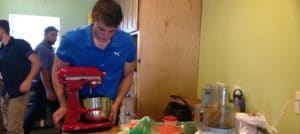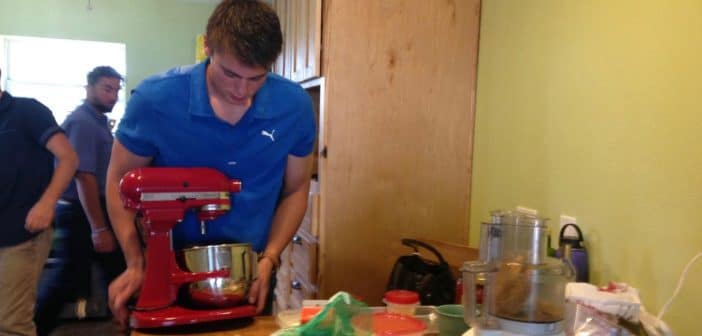 As the founder of a drug and alcohol rehabilitation program for young men, Roy DuPrez is committed not just to helping his clients get clean and sober, but to preparing them for living a full life in recovery. One crucial component begins with their development and awareness in the kitchen.
As the founder of a drug and alcohol rehabilitation program for young men, Roy DuPrez is committed not just to helping his clients get clean and sober, but to preparing them for living a full life in recovery. One crucial component begins with their development and awareness in the kitchen.
“We’re trying to develop a platform for them to gain the necessary life skills in a realistic environment,” says DuPrez, who runs Back2Basics Outdoor Adventure Therapy, a program that combines wilderness therapy and traditional residential treatment in Flagstaff, Arizona.
Many of the clients who come to the program are in early adulthood and haven’t had the chance to develop important life skills, including cooking. That’s why DuPrez decided to incorporate culinary instruction classes into the weekly schedule at Back2Basics. Surprisingly, the culinary program has become one of the most popular and practical parts of the recovery process for Back2Basics clients.
“When I was using or even in my other periods of sobriety I ate terribly because I lacked the confidence or the desire to cook for myself,” says Joseph M., 29, who is in treatment at Back2Basics. “This was extremely unhealthy and lead me to eat a lot of fast food or processed microwave meals out of convenience but most of all this was very expensive.”
However, since participating in the culinary program Joseph has developed new skills that he’ll be able to utilize after rehab.
“I now feel like I have the skill and experience to cook for myself and others, not to mention I will be able to save money by buying my own ingredients and cooking them myself rather than eating out every meal or worse not eating at all,” he says.
Kathy DuPrez, who directs the culinary program, says Joseph’s experience is common. Many of the young men come into the program malnourished, so teaching them about healthy nutrition is essential, she says.
However, that’s only the beginning of pairing cooking and accountability to promote wellness. The whole class can be seen as a metaphor for the step of the recovery process.
“My focus is to teach them how to follow directions, the directions of a recipe,” DuPrez says. “They have to learn to follow them from top to bottom to get a successful final product. We compare that to the program in that if you follow steps you’re more than likely to have a successful recovery.”
Four times a year DuPrez organizes a culinary competition, where teams of clients have to plan a menu that is served to alumni, therapists and others in the recovery community.
“During that time they’re engaged with a team, someone becomes a leader, and they’re exposed to different types of foods,” DuPrez explains.
Most recently the clients chose a Key West Seafood theme, cooking up scallops, lobster and ahi tuna. They had to set their menu on Monday and have the meal planned and prepared by Friday. The whole week was a learning experience, DuPrez says.
“My primary purpose isn’t for them to be a winner, it’s for them to learn about themselves,” she says. “In the beginning its crazy, they’re defining menus and ideas and thinking this is never going to happen. By Friday it was an amazing experience to see what they put on their plates.”
It’s not just during the competition that the culinary students are cooking for an audience. During weekly cooking classes they prep dinner for the whole organization.
For Luke B., 20, the cooking program has had a steep learning curve.
“Considering I knew almost nothing about cooking, I’ve learned a tremendous amount in the culinary program,” he said. “I can now cook an assortment of breakfast foods like omelets, breakfast sandwiches, and even breakfast burritos. As far as other main course meals, we like to make chicken stir-fry, fried chicken and waffles, and lots of pasta dishes.”
Having the practical skills to plan, prep and execute their own meals means that clients have one less thing to worry about when they adjust to life outside Back2Basics.
“To know that they can carry those skills into another part of their lives, that is so important,” DuPrez says.
Get more information on Back2Basics Outdoor Adventure Therapy at www.back2basicsoutdooradventures.com and visit them on Facebook
Photo courtesy of Back2Basics; used with permission.
Sponsored DISCLAIMER: This is a paid advertisement for California Behavioral Health, LLC, a CA licensed substance abuse treatment provider and not a service provided by The Fix. Calls to this number are answered by CBH, free and without obligation to the consumer. No one who answers the call receives a fee based upon the consumer’s choice to enter treatment. For additional info on other treatment providers and options visit www.samhsa.gov.




